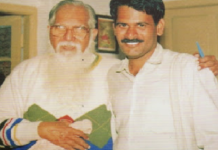
At a time, three people informed me that they can’t make it to the program. Their note in a single sentence made me furious. I returned their fees and disconnected with them once and for all. They are not in my world anymore.
Such people who opt out at the last moment are the ones who deteriorated and diluted many meaningful literary and intellectual initiatives in the past. I have been convening these programs for the past 30 years. I have lost approximately a few lakhs of rupees due to such last minute drop-outs citing silly reasons.
Suppose a program is convened for fifty participants. Everything is planned and arranged with the number in mind. If ten participants pull themselves out, imagine the consequences. None of the expenses can be brought down. In such a circumstance, the convenor is forced to bear the cost meant for those ten participants. If twenty participants back out, the whole program loses its purpose.
But our folks withdraw their commitment without batting an eyelid. In the past, I have been given reasons such as ‘uncle’s visit’ to ‘today we cooked meat’ to avoid such meaningful programs. Once only eight people turned up for a program arranged for forty. Guru Nithya Chaitanya Yati waited for them for quite a while before beginning to converse with a smile to the ones who showed up. Later we came to know the reason for their absence was due to the telecast of Maniratnam’s movie Agni Natchathiram in their television.
In my recent visit to the US, a friend had coordinated an event at Seattle. I always say that unless we charge a non-refundable fee, only a quarter of our people will attend. Programs related to movies are exceptions. Even if the entry is denied, they would show up without minding heat and cold. Any fee to such events is widely accepted without any question.
The friend didn’t take my word. He spoke in person to everyone who agreed to come. Everyone promised to come. I knew that he didn’t collect any fee and I am quite aware of the attitude of the people too. So I published the announcement about the program continuously in my blog. My readers participated from the cities all around. The program was successful. But more than half of the people who agreed to come didn’t turn up. All sorts of reasons were given. Ridiculously, some gave ‘I couldn’t participate’ as the reason for their absence.
Why are they avoiding it? The primary reason is that there is no real engagement with anything intellectual, and that is the way we have grown up. School-college education is the only time when we use knowledge to some extent. And then we do the same work over and over again. The brain remains intact without any kindling. Life gets used to that dormancy.
When people talk about and introduced to intellectual programs, what comes to many people is a superficial kind of interest. And they are not aware of their own brain’s dormancy. ‘If he is going, why can’t I go?’ – is the thought that spurts. Hence they intend to come initially, but seem to avoid it at the time to attend. A reason would arise automatically then. Even a program on TV is enough to stop them.
But the loss for the program coordinators due to their false promise is humongous. If not for their promise, we would be doing our work on a small scale at a minimal cost. Trusting them leads us to loss.
I have been successfully coordinating events in Tamil Nadu for over three decades. Another parallel cannot be cited in this regard. The reason for my success is that I constantly avoid people who are apathetic, reluctant, and negative. An activity cannot be carried out continuously without weeding out.
As far as I am concerned, he who avoids a good event even once without due cause is permanently alienated from me. I expect that his concern and despair for his absence are expressed to me citing due reason. Otherwise I stay away from him completely. I have nothing to lose. Only good virtue remains.
I know very well that none of the petty reasons given by those who hesitate for participation are true. Reluctance is an expression of intellectual stagnation. We can never recover someone who has gone into intellectual stagnation. Even if he himself tries to overcome the stagnation, the success rate is one in a hundred. That recovery is very difficult. I have never seen the recovery of even four or five people who developed such intellectual stagnation in their life.
But if we bind ourselves to someone, who is intellectually stagnant with love or concern, and hope that they can be redeemed, we may also begin to stagnate. We may not be aware of the same. I have come across many people who have been stuck in love with such an intellectually stuck friend. The only thing that can be done is to leave the stagnant one for good.
Laziness of the intellect and its consequence of intellectual dormancy are the deadly diseases of this era. This disease started two centuries ago with the onset of the method of division of work and started spreading wide with the set up of factories and offices. Karl Marx wrote about this with concern. Gandhi wrote too. Today the situation has reached its peak. It is important that we protect ourselves from its possible hazards.
Jeyamohan
Translated by Geethaa Senthilkumar











